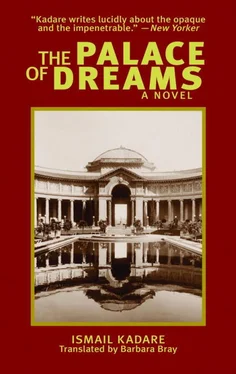“That’s where you’ll be working,” he said.
Mark-Alem looked at the unopened file with its bluish cover.
“The Selection service occupies several rooms like this,” said the boss with a sweep of his arm. “It’s one of the most important departments in the Tabir Sarrail. Some people think Interpretation is the essential department. But it isn’t. The interpreters like to think they’re the aristocrats of this institution, and affect to look down on us selectors. But as you must know, this is pure vanity on their part. Anyone with the least gumption can see that without us here in Selection, Interpretation would be like a mill without any wheat. We’re the ones who supply them with all their raw material. We are the basis of their success.”
He waved a dismissive hand.
“Oh well… You’ll be working here, so you’ll see for yourself. I believe you’ve already been given the necessary instructions. I don’t want to overwhelm you on your first day, so I shan’t go into detail now about all your duties. I’ll just tell you what you need to know to start with, and you can pick up the rest as you go along. This is the chief room in Selection.”
Another of the sweeping gestures.
“Between ourselves, we call it the Lentil Room, because this is where the dreams are first sifted. In other words, this is where it all starts. Here in this very room…”
He blinked as if he’d lost the thread of what he’d been saying.
“Well,” he went on after a moment, “to be quite accurate I ought to say the first sifting is done by our provincial sections. There are about nineteen hundred of them all over the Empire. Each one has its own subsections, and all these cells do a preliminary sorting before they send the dreams to the Center. But the sorting they do is only provisional. The real selection begins here. Just as the farmer separates the wheat from the chaff, so we separate the dreams that contain something of interest from those that do not. It’s this winnowing process that is the essence of our Selection. Do you see?”
The boss’s eyes were growing brighter and brighter. His words, which had come with difficulty before, now crowded on him faster than he could formulate his ideas, and he kept speaking faster and faster as if to try to make use of them all.
“Yes, that’s the principal aim of our work,” he repeated, “to eliminate from the files any dreams that are devoid of interest. To begin with, all those that are purely private and have nothing to do with the State. Then dreams caused by hunger or satiety, cold or heat, illness and so on?in short, all those that are connected with the flesh. Then come the sham dreams, those that never really happened but have been invented by people to further their ambitions, or by myth-omaniacs or provocateurs. All these three categories have to be weeded out. But that’s easily said! It isn’t so easy actually to identify them. A dream may seem to be purely personal, or due to trivial causes like hunger or rheumatism, when in fact it’s directly relevant to matters of State—probably more so than the latest speech by some member of the government! But to recognize that takes experience and maturity. One error of judgment and everything can start to go wrong, do you see? To cut a long story short, ours is very highly skilled work.”
He now abandoned irony and adopted a more easy tone to explain to Mark-Alem what his practical duties would be. There was still a trace in his eyes, however, of previous tension.
“As you’ll have noticed,” he went on, “there are other rooms beside this one, and in order to get a better idea of the work you’ll be called upon to do you must spend a day or two in each of them. Then, when you’ve acquired an overall idea of what Selection is, you’ll come back here to the Lentil Room, where you’ll find the work all the easier because of your initiation. But that won’t begin until next week. Meanwhile, you’ll make a start here.”
He leaned across the table, drew the file over and flipped open its blue cover.
“This is your first file. It contains a group of dreams that arrived on October nineteenth. Read them very carefully, but whatever you do don’t be too hasty. If you think there’s the slightest chance that a dream might have been fabricated, leave it where it is and don’t be in too much of a hurry to remove it. After you there’ll be another sorter, or, to give him his proper title, a second inspector, and he’ll check what you’ve done and correct any errors. Then there’s another inspector to check up on him, and so on. In fact, all the people you see in this room are doing just that. So good luck!”
He stayed there another few seconds looking at Mark-Alem, then turned around and left. Mark-Alem was momentarily rooted to the spot, then slowly, trying not to make any noise, he edged the chair back a little, slid between it and the table, and, still very cautiously, sat down.
The file now lay open in front of him. His wish, and that of his family, had been granted. He’d been given a job in the Tabir Sarrail; he was even sitting on a chair at his desk, a genuine official in the mysterious Palace.
He bent a little closer over the file, until his eyes could make out what was written in it, then calmly began to read. The stiff first page bore the name and date of the file, followed lower down by the inscription Issued to Surkurlah. Contains 63 dreams.
With an apprehensive finger Mark-Alem turned to the next page. This, unlike the first, was covered with closely written text. The first three lines were slightly separated from the rest and underlined in green ink. They read: Dream of Yussuf, clerk in the post office at Aladjehisar, subprefecture of Kerk-Kili, pashalik of Kustendil, last September 3 just before dawn.
Mark-Alem looked up from the file. September 3, he thought bemusedly. Could it all be true? Was he really now an official in the Tabir Sarrail, installed at his own desk and reading the dream of Yussuf, who worked at the post office in Aladjehisar in the subprefecture of Kerk-Kili in the pashalik of Kustendil—reading it in order to settle his fate, to decide whether his dream was to be thrown in the wastepaper basket or inserted into and analyzed by the vast machinery of the Tabir?
He felt a quiver of pleasure run up his spine. Looking down at the file again he read: Three white foxes on the minaret of the local mosque…
Suddenly he was startled by the ringing of a bell. He looked up sharply as if he’d been tapped on the shoulder. Looking first to his left and then to his right, he was amazed by what he saw. All the people who had hitherto seemed glued to their chairs and mesmerized by the files open in front of them had suddenly broken the spell. They were now standing up, chatting and scraping their chairs on the floor as the bell went on echoing through the rooms.
“What is it?” asked Mark-Alem. “What’s going on?”
“It’s the morning break,” answered his nearest neighbor. (But where had he been until now?) “The morning break,” he repeated. “Of course you’re new, so you don’t know the timetable. But you’ll soon learn.”
On all sides the occupants of the room were moving between the long tables and making for the door. Mark-Alem did his best to go on reading, but it was impossible: others kept jostling him and knocking against his chair. But despite all this he bent over the file again, attracted to it now as by a magnet. Three white foxes… Then he heard a voice speaking just by his ear:
“You can get coffee and salep downstairs. Come on, there’s bound to be something you like.”
Mark-Alem scarcely had time to see what the speaker looked like, but he got up, closed the file, and followed everyone else to the door.
Читать дальше












